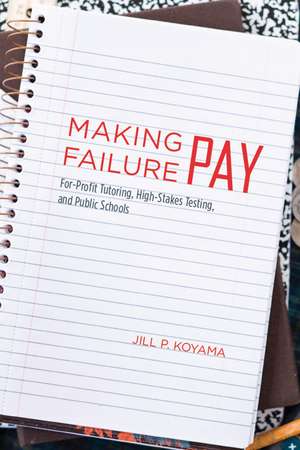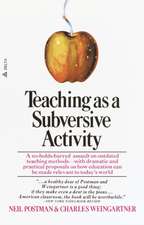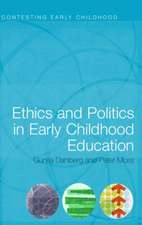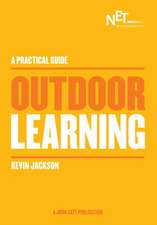Making Failure Pay: For-Profit Tutoring, High-Stakes Testing, and Public Schools
Autor Jill P. Koyamaen Limba Engleză Paperback – 23 sep 2010
As Jill P. Koyama explains in this revelatory book, NCLB—a federally legislated, state-regulated, district-administered, and school-applied policy—explicitly legitimizes giving private organizations significant roles in public education. Based on her three years of ethnographic fieldwork, Koyama finds that the results are political, problematic, and highly profitable. Bringing to light these unproven, unregulated private companies’ almost invisible partnership with the government, Making Failure Pay lays bare the unintended consequences of federal efforts to eliminate school failure—not the least of which is more failure.
| Toate formatele și edițiile | Preț | Express |
|---|---|---|
| Paperback (1) | 251.67 lei 6-8 săpt. | |
| University of Chicago Press – 23 sep 2010 | 251.67 lei 6-8 săpt. | |
| Hardback (1) | 569.39 lei 6-8 săpt. | |
| University of Chicago Press – 23 sep 2010 | 569.39 lei 6-8 săpt. |
Preț: 251.67 lei
Nou
Puncte Express: 378
Preț estimativ în valută:
48.18€ • 49.55$ • 39.97£
48.18€ • 49.55$ • 39.97£
Carte tipărită la comandă
Livrare economică 19 februarie-05 martie
Preluare comenzi: 021 569.72.76
Specificații
ISBN-13: 9780226451749
ISBN-10: 0226451747
Pagini: 192
Ilustrații: 2 tables
Dimensiuni: 152 x 229 x 15 mm
Greutate: 0.3 kg
Editura: University of Chicago Press
Colecția University of Chicago Press
ISBN-10: 0226451747
Pagini: 192
Ilustrații: 2 tables
Dimensiuni: 152 x 229 x 15 mm
Greutate: 0.3 kg
Editura: University of Chicago Press
Colecția University of Chicago Press
Notă biografică
Jill P. Koyama is assistant professor in the Department of Educational Leadership and Policy at the Graduate School of Education at the University at Buffalo, State University of New York.
Cuprins
Acknowledgments
1 Engaging Failure
Probing the Problematics and Politics of Policy
2 Framing Failure
Interrogating Policy Studies, Policy Theory, and NCLB
3 Supplementing Failure
Providing Supplemental Educational Services
4 Accentuating Failure
Emphasizing the Need for “Help”
5 Neglecting Failure
Ignoring the Need for “Help”
6 Fabricating Failure
Making Up the Need for “Help”
7 Abandoning Failure
Diffusing Its Impact
Notes
References
Index
1 Engaging Failure
Probing the Problematics and Politics of Policy
2 Framing Failure
Interrogating Policy Studies, Policy Theory, and NCLB
3 Supplementing Failure
Providing Supplemental Educational Services
4 Accentuating Failure
Emphasizing the Need for “Help”
5 Neglecting Failure
Ignoring the Need for “Help”
6 Fabricating Failure
Making Up the Need for “Help”
7 Abandoning Failure
Diffusing Its Impact
Notes
References
Index
Recenzii
“This is a rare and powerful take on the role and work of supplementary educational services. In investigating these services, Koyama has staked out a whole new domain for closer inquiry, successfully convincing us that they deserve scrutiny and often perpetuate failure. Making Failure Pay should be shared and should inform future research and policy making.”
“A riveting and highly disturbing account of the unforeseen effects of NCLB in the New York City Public Schools, Making Failure Pay demonstrates the full force of new anthropological approaches to the examination of educational policy. It exposes NCLB’s hidden public-private ‘liaisons’ that enable companies to profit from the provision of substandard and poorly regulated services that perpetuate student failure. Conceptually sophisticated and lucidly written, this book is indispensible reading for educational policymakers, policy researchers, and all who have a stake in U.S. urban schools.”
“While the book is engaging, its results are highly disturbing, as it reveals the degree to which SES providers are unaccountable and ineffective. . . . The book is unique due to the subject of investigation, and because it studies education policy by focusing on studying how legal requirements are enacted and negotiated by actors at the level of the school and the school district. It is a must read for both general audiences and students of education policy.”





















